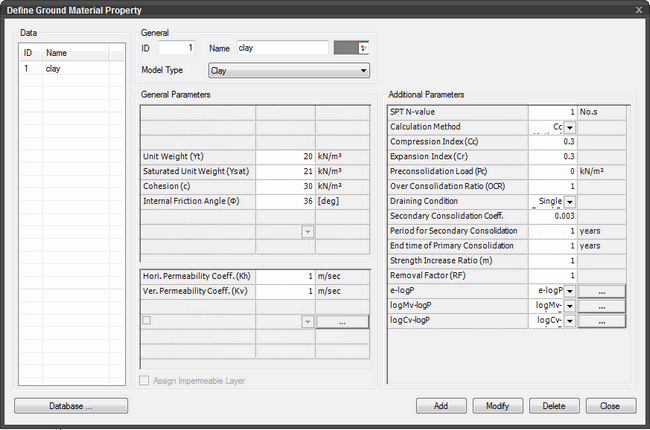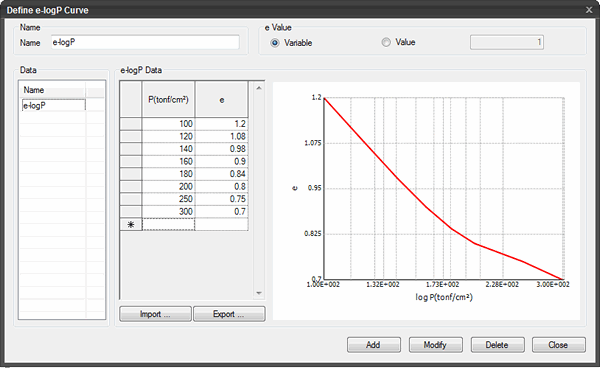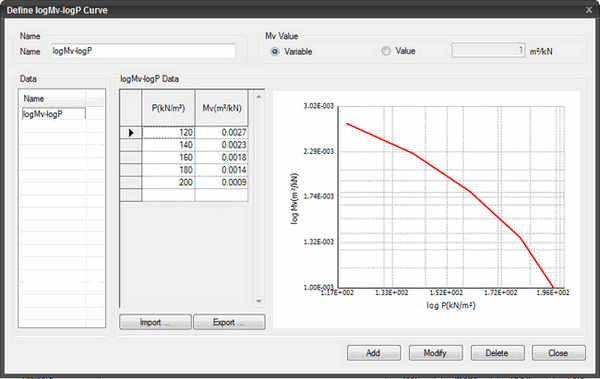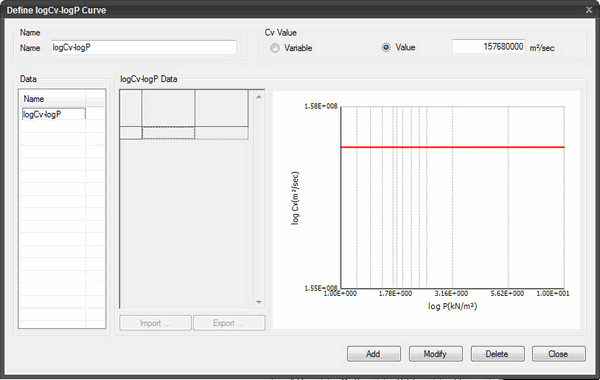
General Parameters
Unit Weight (Υt)
The weight of soil per unit volume.
Saturated Unit Weight
(Υsat)
The weight of saturated soil per unit volume.
Cohesion (c)
It is a measure of the forces that cement
particles of soil.
Internal Friction Angle
(Φ)
It is a measure of the shear strength of
soils due to friction.
Hori. Permeability Coeff.
(Kh)
The coefficient of permeability in horizontal
direction.
Ver. Permeability Coeff.
(Kv)
The coefficient of permeability in vertical
direction.
Additional
Parameters
SPT
N-value
The
value for fine grained soils obtained from the SPT (Standard Penetration
Test). It is an in-situ dynamic penetration test which is designed to
obtain engineering properties of soil. It is preferred when it is difficult
to take undisturbed samples of soils.
Calculation
Method
Use a method to calculate
primary settlement.
Cc
Method
Method using the Compression
Index (Cc).
∆e Method
Method using the change
in void ratio (∆e).
Mv
Method
Method using the Modulus
of Volume Compressibility.
Compression
Index (Cc)
It is the slope of the
Normal Consolidation Line in a plot of the log of vertical
effective stress vs. void ratio.
Expansion
Index (Cr)
It is the average slope
of the unloading/reloading curves in a plot of the log of vertical
effective stress vs. void ratio.
Preconsolidation
Load (Pc)
It is the maximum vertical
effective stress that a soil was subjected to in the past..
Over
Consolidation Ratio (OCR)
It is the ratio by which
the current vertical effective stress in the soil was exceeded in the
past.
Draining
Condition
The
distance of the longest vertical path taken by a particle to exit the
soil is called the length of the drainage path. Shorter drainage paths
will cause the soil to complete its settlement in a shorter time as compared
than a longer drainage path.
Single
Faced Drainage
When the drainage is
permitted from only one face of the soil, then
Hdr = Hav = Ho+Hf/2;
where Hav is the average height and Ho and Hf are the initial and final
heights.
Double
Faced Drainage
When the drainage is
permitted from two faces of the soil, then
Hdr = Hav/2 = Ho+Hf/4
Secondary
Consolidation Coeff.
It is the slope of the
Secondary Consolidation Curve. Overconsolidated soils do not creep significantly
as compared to normally consolidated soils.
Period
for Secondary Consolidation
Completion of Secondary
Consolidation (assumed).
End
time of Primary Consolidation
It is the time coordinate
at the intersection of the tangents to the Primary Consolidation and Secondary
Consolidation parts of the void ratio
vs. log of time curve.
Strength
Increase Ratio (m)
It is the ratio of the
post-consolidation strength to the pre-consolidation strength. The soil
strength changes as a result of consolidation. Increase in density by
compaction usually increases the shearing resistance.
Removal
Factor (RF)
The factor by which
final load is removed (either in one or several stages) after full consolidation
is reached.
e-logP
logMv-logP
logCv-logP
| 






 on the right to invoke the
on the right to invoke the 

